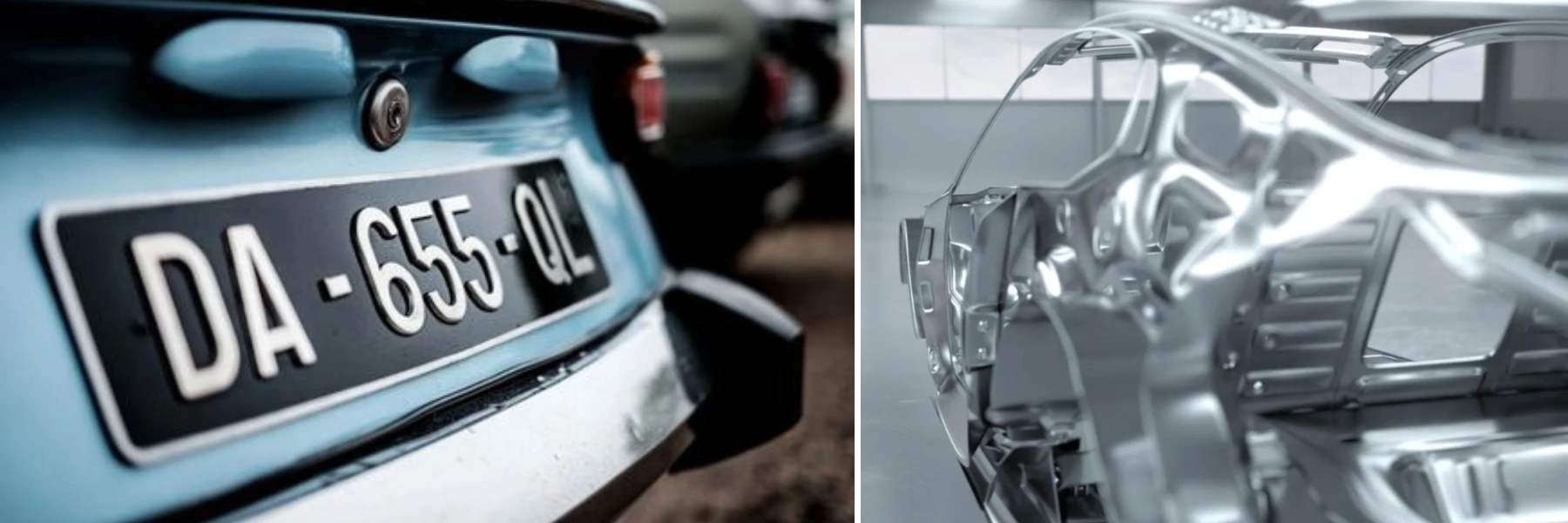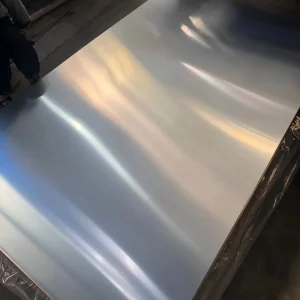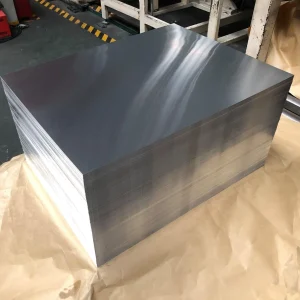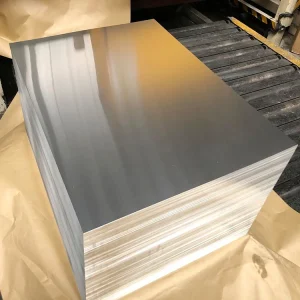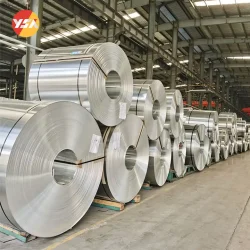Product Introduction
Anodized aluminum undergoes an electrochemical process that forms a protective oxide layer on the surface, enhancing its durability, corrosion resistance, and aesthetic appeal.
Anodized aluminum in the 1000 series is well-suited for automotive license plates, car body panels, doors, and roofs, while the 3000 series is commonly employed for vehicle body structures and chassis components. These materials offer a balance of strength, formability, corrosion resistance, and aesthetic versatility to meet the requirements of the automotive industry.
Specifications
| Alloy | 1000, 3000, 5000, 6000, 8000 Series |
| Temper | O – H112 , T3 – T8 , T351 – T851 |
| Width | up to 2600 mm |
| Thickness | 0.01 mm-350 mm |
| Size | Size can be customized |
| Delivery Time | Ready stock 7-10 days |
| MOQ | 1 ton |
| Loading Port | Qingdao Port, Tianjin Port, Shanghai port. |
| Price Terms | FOB, CIF, CFR, CNF, etc. |
| Quality Control | Mill Test Certification is supplied with shipment, Third Party Inspection is acceptable. |
Applications
In the automotive industry, anodized aluminum is commonly used to manufacture automotive components and license plates.
For general automotive components, the 1xxx series anodized aluminum is often used, such as alloys like 1050, 1060, 1100, and others. These alloys are suitable for manufacturing automotive license plates, car body panels, doors, and roofs. The 1xxx series aluminum has excellent cutting and forming properties, as well as good corrosion resistance.
For automotive components that require higher strength, the 3xxx series anodized aluminum may be used, including alloys like 3003, 3004, 3005, and 3105. These alloys offer higher strength and mechanical properties, along with good cutting, forming, and corrosion resistance. In automotive manufacturing, these alloys are commonly used for manufacturing vehicle body structures, chassis components, and other parts that need to withstand high pressure.
Product Advantages
As a professional manufacturer with decades of experience in aluminum materials, our anodized aluminum exhibits outstanding performance:
- Corrosion Resistance: Yongsheng anodized aluminum features an excellent resistance to corrosion. The oxide layer is highly resistant to fading or degradation, allowing it to maintain surface integrity and durability even in harsh environments, addressing the shortcomings of regular aluminum in acidic or alkaline conditions.
- High Hardness: Anodized aluminum treated by Yongsheng possesses high hardness. The oxide layer of Yongsheng’s anodized aluminum demonstrates excellent wear resistance, enabling it to withstand scratches and abrasion to maintain its aesthetic appeal and protect the underlying material.
- Insulation: Our anodized aluminum exhibits good insulation properties, making it suitable for electronic and electrical applications as an insulating material.
- Uniformity: The oxide layer of Yongsheng’s anodized aluminum demonstrates high uniformity, ensuring a consistent performance and appearance throughout the entire surface of the aluminum material.
- Controllable Film Thickness: The thickness of the oxide film in anodized aluminum can be precisely controlled by adjusting the processing time and conditions, meeting the requirements of various applications. Yongsheng Aluminum is capable of producing oxide layers with different thicknesses, ranging from a few micrometers to tens of micrometers.
- Adhesion: Yongsheng guarantees excellent adhesion between the oxide layer and the substrate, providing long-lasting protection.
- Thermal Stability: Yongsheng’s anodized aluminum can maintain its performance and appearance stability within a certain temperature range, exhibiting high temperature resistance.
Alloys
Commonly used anodized aluminum base materials include the 1xxx and 3xxx series aluminum. Specific parameters for the different alloys of the 1xxx and 3xxx series aluminum by Yongsheng:
| Alloy | State | Thickness(mm) | Tensile Strength(Mpa) | The Yield Strength(Mpa) | elongation(%) | hardness(HV) |
| 1050 (1060) |
0 | >0.2-0.5 | 60-100 | ≥15 | ≥20 | 20-30 |
| >0.5-1.0 | ≥30 | |||||
| >1.0-4.0 | ≥35 | |||||
| H22 | >0.2-0.5 | 80-120 | ≥60 | ≥12 | 30-40 | |
| >0.5-1.0 | ≥15 | |||||
| >1.0-4.0 | ≥18 | |||||
| H24 | >0.2-0.5 | 95-135 | ≥70 | ≥6 | 35-45 | |
| >0.5-1.0 | ≥8 | |||||
| >1.0-4.0 | ≥10 | |||||
| H26 | >0.2-0.5 | 110-155 | ≥75 | ≥2 | 43-55 | |
| >0.5-1.0 | ≥4 | |||||
| >1.0-4.0 | ≥6 | |||||
| H18 | >0.2-0.5 | ≥125 | ≥85 | ≥2 | 50-65 | |
| >0.5-1.0 | ≥3 | |||||
| >1.0-4.0 | ≥4 | |||||
| Alloy | State | Thickness(mm) | Tensile Strength(Mpa) | The Yield Strength(Mpa) | elongation(%) | hardness(HV) |
| 1100 | 0 | >0.2-0.5 | 75-105 | ≥25 | ≥18 | 25-30 |
| >0.5-1.0 | ≥30 | |||||
| >1.0-4.0 | ≥35 | |||||
| H22 | >0.2-0.5 | 95-130 | ≥75 | ≥12 | 30-40 | |
| >0.5-1.0 | ≥15 | |||||
| >1.0-4.0 | ≥18 | |||||
| H24 | >0.2-0.5 | 110-145 | ≥95 | ≥6 | 38-40 | |
| >0.5-1.0 | ≥8 | |||||
| >1.0-4.0 | ≥10 | |||||
| H26 | >0.2-0.5 | 130-165 | ≥115 | ≥2 | 45-60 | |
| >0.5-1.0 | ≥4 | |||||
| >1.0-4.0 | ≥6 | |||||
| H18 | >0.2-0.5 | ≥150 | ≥130 | ≥2 | 55-70 | |
| >0.5-1.0 | ≥3 | |||||
| >1.0-4.0 | ≥4 | |||||
| 3003 (3A21) |
0 | > 0.2-0.5 | 95-140 | ≥ 35 | ≥ 15 | 30-40 |
| > 0.5-1.0 | ≥ 30 | |||||
| > 1.0-4.0 | ≥ 35 | |||||
| H22 | > 0.2-0.5 | 120-160 | ≥90 | ≥ 12 | 39-53 | |
| > 0.5-1.0 | ≥ 15 | |||||
| > 1.0-4.0 | ≥ 18 | |||||
| H24 | > 0.2-0.5 | 145-195 | ≥125 | ≥ 6 | 42-59 | |
| > 0.5-1.0 | ≥ 8 | |||||
| > 1.0-4.0 | ≥ 10 | |||||
| H26 | > 0.2-0.5 | 170-210 | ≥150 | ≥ 2 | 55-65 | |
| > 0.5-1.0 | ≥ 4 | |||||
| > 1.0-4.0 | ≥ 6 | |||||
| H18 | > 0.2-0.5 | ≥ 190 | ≥ 170 | ≥ 2 | 60-85 | |
| > 0.5-1.0 | ≥ 3 | |||||
| > 1.0-4.0 | ≥ 4 | |||||
| Alloy | State | Thickness(mm) | Tensile Strength(Mpa) | The Yield Strength(Mpa) | elongation(%) | hardness(HV) |
| 3004 (3104) |
0 | > 0.2-0.5 | 155-200 | ≥ 60 | ≥ 13 | 49-62 |
| > 0.5-1.0 | ≥ 16 | |||||
| > 1.0-4.0 | ≥ 20 | |||||
| H22 | > 0.2-0.5 | 190-240 | ≥ 145 | ≥ 10 | 60-84 | |
| > 0.5-1.0 | ≥ 12 | |||||
| > 1.0-4.0 | ≥ 14 | |||||
| H24 | > 0.2-0.5 | 220-265 | ≥ 170 | ≥ 8 | 68-100 | |
| > 0.5-1.0 | ≥ 10 | |||||
| > 1.0-4.0 | ≥ 12 | |||||
| H26 | > 0.2-0.5 | 240-285 | ≥ 190 | ≥ 3 | 72-110 | |
| > 0.5-1.0 | ≥ 4 | |||||
| > 1.0-4.0 | ≥ 6 | |||||
| H18 | > 0.2-0.5 | ≥ 260 | ≥ 230 | ≥ 2 | 85-120 | |
| > 0.5-1.0 | ≥ 2 | |||||
| > 1.0-4.0 | ≥ 3 | |||||
| Alloy | State | Thickness(mm) | Tensile Strength(Mpa) | The Yield Strength(Mpa) | elongation(%) | hardness(HV) |
| 3005 | 0 | >0.2-0.5 | 115-165 | ≥45 | ≥13 | 35-45 |
| >0.5-1.0 | ≥20 | |||||
| >1.0-4.0 | ≥25 | |||||
| H22 | >0.2-0.5 | 145-195 | ≥110 | ≥10 | 40-60 | |
| >0.5-1.0 | ≥15 | |||||
| >1.0-4.0 | ≥15 | |||||
| H24 | >0.2-0.5 | 170-215 | ≥130 | ≥6 | 58-70 | |
| >0.5-1.0 | ≥8 | |||||
| >1.0-4.0 | ≥10 | |||||
| H26 | >0.2-0.5 | 195-240 | ≥160 | ≥3 | 65-83 | |
| >0.5-1.0 | ≥4 | |||||
| >1.0-4.0 | ≥6 | |||||
| H18 | >0.2-0.5 | ≥220 | ≥200 | ≥2 | 80-100 | |
| >0.5-1.0 | ≥3 | |||||
| >1.0-4.0 | ≥3 | |||||
| Alloy | State | Thickness(mm) | Tensile Strength(Mpa) | The Yield Strength(Mpa) | elongation(%) | hardness(HV) |
| 3105 | 0 | >0.2-0.5 | 75-105 | ≥25 | ≥14 | 32-42 |
| >0.5-1.0 | ≥20 | |||||
| >1.0-4.0 | ≥25 | |||||
| H22 | >0.2-0.5 | 95-130 | ≥75 | ≥10 | 39-60 | |
| >0.5-1.0 | ≥12 | |||||
| >1.0-4.0 | ≥12 | |||||
| H24 | >0.2-0.5 | 110-145 | ≥95 | ≥8 | 52-62 | |
| >0.5-1.0 | ≥10 | |||||
| >1.0-4.0 | ≥10 | |||||
| H26 | >0.2-0.5 | 130-165 | ≥115 | ≥3 | 58-72 | |
| >0.5-1.0 | ≥4 | |||||
| >1.0-4.0 | ≥6 | |||||
| H18 | >0.2-0.5 | ≥150 | ≥130 | ≥2 | 65-95 | |
| >0.5-1.0 | ≥2 | |||||
| >1.0-4.0 | ≥3 |


